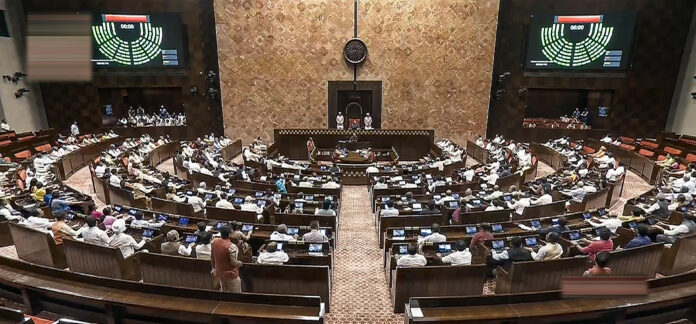Bharatiya Janata Party (BJP) Members of Parliament (MPs) on Monday expressed strong support for the ‘One Nation, One Election’ bill, emphasizing its importance in synchronizing national and state elections to save time, money, and resources.
The bill, which proposes simultaneous elections for the Lok Sabha and state assemblies, is set to be introduced in Lok Sabha on Tuesday. The agenda for the session includes the Constitution Amendment Bill to facilitate simultaneous elections.
BJP Rajya Sabha MP Brij Lal welcomed the bill, recalling that simultaneous elections for Lok Sabha and state assemblies were held until 1966. He pointed out the logistical challenges posed by multiple elections throughout the year, which tie up security forces and impede development projects. Lal emphasized that the bill would streamline the electoral process and free up resources for development.
“We welcome this bill. The first Lok Sabha elections took place in 1952. Till 1966, the Lok Sabha and state assembly elections happened simultaneously. Now the elections go on for the whole year. Our forces have to look after law and order and the borders. All our forces are occupied, but they are called from there and deployed for elections. The Code of Conduct is imposed, holding all the development projects. Now one nation, one election would be implemented, which would save time and money, and the development will accelerate,” Lal stated.
Rajya Sabha MP Rekha Sharma also expressed her support for the bill, highlighting its potential to save significant amounts of money and time, which could be redirected to development and infrastructure projects.
“This is a very important bill, and it will save a lot of money, resources, and time. Development should be accelerated, and the money saved will be used for development and infrastructure development. I am looking forward to it… We welcome this bill because this is the most important, and I think that this should have been done earlier,” Sharma added.
BJP Lok Sabha MP Sudhakar K echoed the sentiments, stating that the ‘One Nation, One Election’ proposal aligns with the government’s vision of ensuring uninterrupted progress. He noted that the current election cycle often wastes valuable time and resources, hindering governance and development.
“One Nation, One Election is the ultimate wish of this government…It is just to make sure that the country is going to be put on a path of progress without any hindrance due to continuous election processes. We waste at least one and a half years during the election processes of various states,” Sudhakar said.
He further emphasized that the bill would contribute to good governance, urging all lawmakers to support the proposal, irrespective of political considerations.
“The administration and the development take a back seat… It’s a very good move. Secondly, we will even save a lot of funds… We’ll be supporting this, and maybe it is being tabled tomorrow… I request all the members of all the parties to not stick to the political part of it. This is in the interest of the nation. Please support this bill and ensure that this country is put on the path of good governance and development,” he urged.
The Constitution (One Hundred and Twenty-Ninth Amendment) Bill will be introduced by Union Law Minister Arjun Meghwal on Tuesday. Meghwal is also expected to introduce another bill to amend the Government of Union Territories Act, 1963, the Government of National Capital Territory of Delhi Act, 1991, and the Jammu and Kashmir Reorganisation Act, 2019. This amendment aims to align elections in Delhi, Jammu and Kashmir, and Puducherry for the purpose of simultaneous elections.
Earlier this month, the Union Cabinet approved the ‘One Nation, One Election’ bill, paving the way for its introduction in Parliament. However, the proposal has sparked debate, with opposition parties of the INDIA bloc expressing their opposition, while BJP-led NDA alliance parties have welcomed it.
The proposal aims to hold simultaneous elections for Lok Sabha, state assemblies, urban bodies, and panchayats within a span of 100 days. The recommendations for this plan were made by a high-level panel chaired by former President Ram Nath Kovind.
Following the Cabinet’s approval, Prime Minister Narendra Modi hailed the decision, calling it a significant step towards enhancing India’s democracy.


